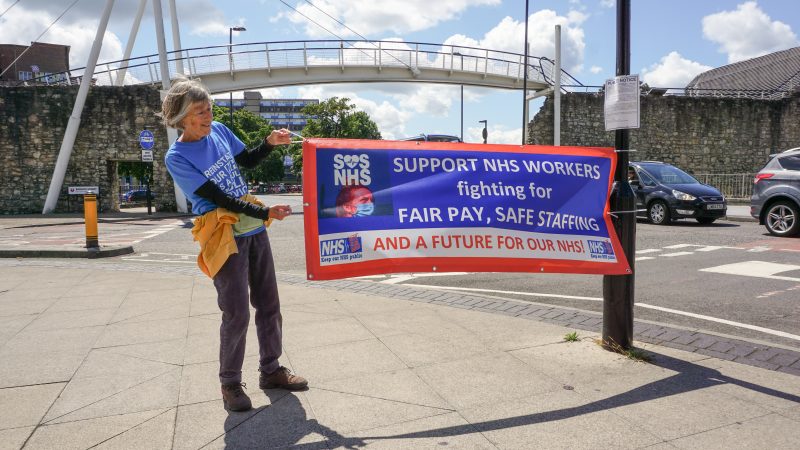
Last week, a would-be Tory leader insulted care workers with a comment about wiping bottoms. This week, a Labour government has a chance to get on the front foot again with transformative plans for the sector’s workers. The employment rights bill, expected tomorrow, could be one of the most important changes in the law since the Equality Act.
“I’m on an insecure contract and dread being sick. It is so stressful for me and my kids always being skint.” I cannot stress how often I hear words like this.
Nine in 10 of my members are women and a large and growing number are international recruits – the very migrant care workers that Kemi Badenoch appeared to be taking aim at.
In the Royal College of Nursing, we represent registered nurses, carers and support workers in social care just as much as the NHS. But their employment terms and conditions could not be more different.
Negotiating a good deal
In the UK, there are over 30,000 organisations providing social care to adults, children and young people. They are a crucial part of the health and care system. Some are genuinely good employers who value and reward their staff but the reality is that too many force workers to live with low pay, insecure employment and few rights.
Without sick pay provision, nursing staff choose between their own health and their much-needed income. And protections around workplace harassment, women’s health and flexible working could not be needed more. Advancing women’s rights in the workplace must be central to the government’s bill on Thursday.
READ MORE: Budget 2024: FBU warns Tory austerity ‘needs to stop’ to rebuild fire services
Care workers, the vast majority of whom are female, are at the intersection of an undervalued profession considered ‘women’s work’ and a sector so vast and atomised it resembles a ‘Wild West’ of employment standards – employed by their local authority, a private care firm, or even a hedge fund.
There is no opportunity for staff to negotiate and make their voice heard on a sector-wide level, allowing a race to the bottom on pay and rights. And at worst – as we were part of exposing this summer – flagrant, unchecked exploitation of migrant workers.
The government’s proposals must mark the beginning of the end for this disgrace. We expect proper sectoral bargaining finally introduced first for adult social care. This should allow consistent pay, terms and conditions to be set across the sector, providing better job security and, crucially, raising employment standards for everyone working in the sector. Along with all unions, we have called for this for many years.
Protecting our workers’ rights
In the consultations and debates around the new Bill, we will push the government to properly enshrine sectoral bargaining in law. The absence of that could simply allow rogue employers to find loopholes and pave the way for a future government to easily rip up or quietly abandon the measures entirely.
The government’s plan to introduce statutory sick pay from day one is a crucial first step. Next, we need commitments to enhance the level of sick pay itself – and make that a right from the very start of employment too. Like so much in society, changes during the pandemic saw sick pay paid from day one only for the progress to be lost in the years after.
Tomorrow’s Bill is expected to transform the work of unions as well as the working lives of their members. The promised repeal of anti-union laws – reaffirmed in a letter I received last week from Jonathan Reynolds – along with the introduction of e-balloting, could pave the way for a new era in the business of industrial relations and trade unionism.
READ MORE: ‘How can Keir Starmer deliver his pledge to rebuild trust in politics?’
These changes will give nursing staff greater power to organise, demand fair pay and improve working conditions in a profession historically characterised as a vocation. Female-dominated professions remain some of the worst paid, with inferior terms and conditions. The last government learned the hard way that ignoring nursing staff and stripping away their rights will not be tolerated.
These vital discussions on health and safety at work or strengthening protections for women – and all workers – would be enriched by reaching out to our nursing staff and working with one of the country’s biggest professional bodies and unions.
Sectoral bargaining in social care, advancing women’s workplace rights, and bringing down the curtain on some of Europe’s most restrictive trade union laws is the strong starting point our profession is already expecting of this government on Thursday.
Let’s collaborate further so that the bold and new approach truly delivers for working people.
SHARE: If you have anything to share that we should be looking into or publishing about this story – or any other topic involving Labour– contact us (strictly anonymously if you wish) at [email protected].
SUBSCRIBE: Sign up to LabourList’s morning email here for the best briefing on everything Labour, every weekday morning.
DONATE: If you value our work, please donate to become one of our supporters here and help sustain and expand our coverage.
PARTNER: If you or your organisation might be interested in partnering with us on sponsored events or content, email [email protected].




More from LabourList
Tom Belger column: ‘Why is Labour making migrant exploitation easier?’
Ashley Dalton resigns as health minister for cancer treatment
Paul Nowak column: ‘Labour must focus on the basics’